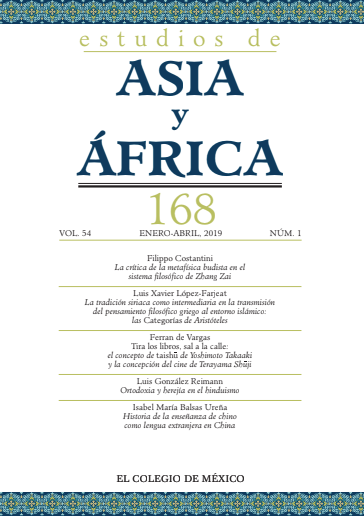Resumen
Si bien el problema mente-cuerpo ha sido central en la tradición del pensamiento indoeuropeo, los filósofos de la antigua China mostraron escaso interés en el tema. A pesar de ello, la posición que implícitamente defendieron ha sido muy discutida en tiempos recientes. Un consenso entre los historiadores es que nunca respaldaron un dualismo ontológico fuerte y que, de hecho, esa idea habría sido extraña en China antes de la introducción del budismo. Los supuestos ontológicos e intelectuales de la época parecen contribuir a esa lectura. Sin embargo, en los últimos años algunos autores han argumentado que sí había un dualismo mente-cuerpo en ese periodo, pero mi análisis crítico de estas posiciones concluye que sus argumen-tos son insuficientes para refutar el consenso tradicional.
Referencias
Allan, S. (2012). On Shu 書 (Documents) and the origin of the Shang shu 尚書 (Ancient Documents) in light of recently discovered bamboo slip manuscripts. Bulletin of the School of Oriental and African Studies, 75(3), 547-557.
Ames, R., & Hall, D. (2010). Dao De Jing: a philosophical translation. Ballantine Books.
Chen, X. (2016). The problem of mind in Confucianism. Asian Philosophy, 26(2), 166-181.
Chen, X. (2017). Mind and space: a Confucian perspective. Asian Philosophy, 27(1), 1-15.
Fu, C. (1978). Fingarette and Munro on Early Confucianism: A Methodological Examination. Philosophy East and West, 28(2), 181-198. doi:10.2307/1397742
Galvany, A. (2003). Estudio preliminar de un manuscrito taoísta hallado en china: Tai yi sheng shui. Edición digital a partir de Boletín de la Asociación Española de Orientalistas, Vol. 39, pp.257-269
Goldin, P. (2015). “The Consciousness of the Dead as a Philosophical Problem in Ancient China,” in The Good Life and Conceptions of Life in Early China and Græco-Roman Antiquity, ed. R.A.H. King, Chinese-Western Discourse 3 (Berlin: De Gruyter), pp. 59-92.
Graham, A. C. (2013). El Dao en disputa: La argumentación filosófica en la China antigua. Fondo De Cultura Económica.
Hansen, C. (2000). A Daoist theory of Chinese thought: A philosophical interpretation. Oxford University Press.
Hutton, E. L. (2014). Xunzi: The complete text. Princeton University Press.
Klein, E., & Klein, C. (2012). Did the Chinese have a change of heart?. Cognitive science, 36(2), 179-182.
Liu, S. & Shun, K. [trad]. (1996). Some Reflections on Mencius' Views of Mind-Heart and Human Nature. Philosophy East and West, 46(2), 143-164.
Liu, J. (2015). In Defence of Chinese Qi-Naturalism. Chinese metaphysics and its problems, 33-53
Makeham, J. (1996). The formation of Lunyu as a book. Monumenta Serica, 44(1), 1-24.
Michael, T. (2005). The Pristine Dao: Metaphysics in Early Daoist Discourse. SUNY Press.
Pérez Arroyo, J. (2002). Los cuatro libros. Paidos Orientalia. Barcelona.
Perkins, F. (2014). Divergences within the Lǎozǐ: A Study of Chapters 67-81. T'oung Pao, 100(1-3), 1-32.
Reilly, R. (2012). Fingarette on Moral Agency in the Analects. Philosophy East and West, 62(4), 529-544.
Rosemont, H. (1978). Reply to Professor Fingarette. Philosophy East and West, 28(4), 515-519
Roth, H. D. (1990). The Early Taoist Concept of Shen: a Ghost in the Machine. Sagehood and Systemizing Thought in Warring States and Han China. Brunswick, Me.: Asian Studies Program, 11-32.
Schuessler, A. (2007). ABC etymological dictionary of Old Chinese. University of Hawaii Press.
Schwartz, B. (1985). The world of thought in ancient China. Belknap Press. Cambridge, Massachusetts.
Slingerland, E., & Chudek, M. (2011). The prevalence of mind–body dualism in early China. Cognitive Science, 35(5), 997-1007.
Slingerland, E., & Chudek, M. (2012). The Challenges of Qualitatively Coding Ancient Texts. Cognitive science, 36(2), 183-186.
Slingerland, E. (2013). Body and Mind in Early China: An Integrated Humanities–Science Approach. Journal of the American Academy of Religion, 81(1), 6-55.
Slingerland, E., Nichols, R., Neilbo, K., & Logan, C. (2017). The Distant Reading of Religious Texts: A “Big Data” Approach to Mind-Body Concepts in Early China. Journal of the American Academy of Religion, 85(4). https://doi.org/10.1093/jaarel/lfw090
Van Norden, B. (2007). Virtue ethics and consequentialism in early Chinese philosophy. Cambridge University Press.
Van Norden, B. (2008). Mengzi: With selections from traditional commentaries. Hackett Publishing.
Yong-yun Lee (2010) A Naturalistic Understanding of Taiyi sheng shui cosmology, disponible en: http://cccp.uchicago.edu/archive/2010Creel-LucePaleographyWorkshop/Yong-yun%20Lee%20-%20on%20Taiyi%20sheng%20shui%20Cosmology.pdf
Yü, Y. (1987). "O Soul, Come Back!" A Study in The Changing Conceptions of the Soul and Afterlife in Pre-Buddhist China. Harvard Journal of Asiatic Studies, 47(2), 363-395. doi:10.2307/2719187
Esta obra está bajo una licencia internacional Creative Commons Atribución-NoComercial-SinDerivadas 4.0.
Derechos de autor 2022 Estudios de Asia y África


